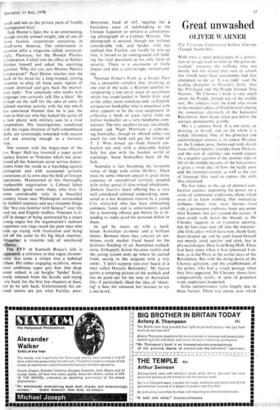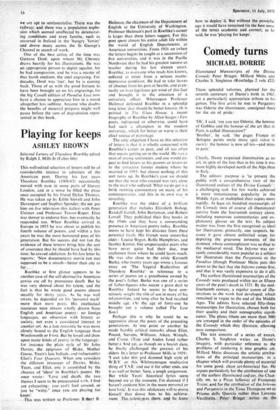Great unwashed
OLIVER WARNER
The Victorian Underworld Kellow Chesney (Temple Smith 60s) With what a sneer pedagogues of a genera- tion or so ago used to refer to 'the great un- washed,' meaning the millions who not merely did not attend their sort of school, but would have been unwelcome had they attempted to do so. 'I seas told,' said the leading character in Disraeli's Sybil. 'that the Privileged and the People formed Two Nations. Mr Chesnes's book is very much about the People, though not of the middle sort. His subjects w ere the kind who swam in the muddier eddies of English rivers during the immediate aftermath of the Industrial Revolution, their heads often just below the surface, permanently grubby.
His is a salutary book. It is not nasty, or gloating, or biased, and on the whole it is widely informed. One of his principal and acknowledged sources is of course Mayhew on the London poor, buttressed with details from official reports, excerpts from Dickens. and the sort of sidelines one would expect. As a popular account of the seamier sides of life in the middle decades of the last century it gives a s k id idea of how the really poor and the criminal existed, as well as the sort of language they used to express the skills they exercised.
We live today in the age of internal com- bustion engines, depending for power on a series of continuous explosions about which most of us know nothing. Our immediate forbears—those who were literate—lived with a permanent explosive force not under their bonnets, but just around the corner. A man could walk down the Strand, as Mr Chesney suggests in an evocative opening, but let him once turn off into the innumer- able little alleys which have now, thank God, been cleaned up, and he soon found himself not merely amid squalor and stink, but in physical danger. Here used King Mob. There had been times when it had terrorised Lon- don, as it did Paris in the earlier days of the Revolution. But with the dying down of the Chartist agitation, and the establishment of the police, who had a rough passage when they first appeared, Mr Chesney shows how comparatively rarely, in spite of perpetual want, explosions happened.
Grim circumstances were largely due to three factors. There was steam, over which
we are apt to sentimentalise. There was the railway; and there was a population explo- sion which seemed unaffected by deteriorat- ing conditions and even famine, such as occurred in Ireland in the 'hungry 'forties' and drove many across the St George's Channel in search of work.
One of the best artists of the time was Gustave Dore, upon whom Mr Chesney draws heavily for his illustrations. He was an appropriate person to depict squalor, fo.r he had compassion, and he was a master of that harsh medium, the steel engraving. For decades, Dore was 'out', but he is coming back. Those of us with the good fortune to have been brought up on his engravings for the big Cassell edition of Paradise Lost now have a chance to appreciate him in a mood altogether less sublime. Anyone who doubts the benefits of material progress might well pause before the sum of degradation repre- sented in this book.































 Previous page
Previous page